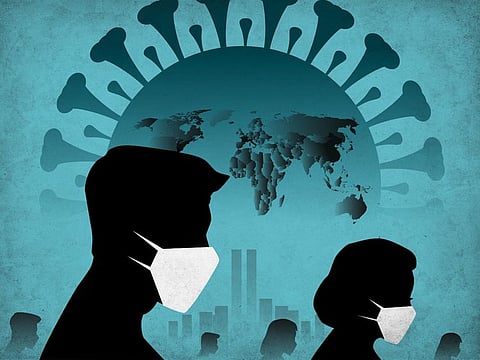Coronavirus is much worse than 9/11
When seclusion is compulsory, it’s a lonely, claustrophobic and crazy-making condition

After the terrorist attacks of Sept. 11, 2001, Americans were exhorted to defiance. I remember it well.
Don’t let the terrorists win, we were told. Don’t let them steal your joys or disrupt your routines — at least not much.
The spectre of the coronavirus is utterly different from prior moments of national panic or devastation. I keep hearing comparisons to Sept. 11 in particular, and I understand why: The terror now is similar to the terror then, a wicked weave of vulnerability, helplessness and the inability to guess what’s next.
But there’s something crueler at work this time around, a psychological contradiction and emotional oxymoron that are peculiar to a pandemic.
At the very moment when many of us hunger most for the reassurance of company and the solace of community, we’re hustled into isolation. At the very moment when we most desperately crave distraction, many of our favourite means of release are off-limits.
It’s not just concerts and sporting events that are verboten or cancelled. It’s not just restaurant meals, birthday parties, wedding receptions. It’s not just action flicks at the multiplex, which can no longer fling superheroes at us when superheroes are just what we need.
“Social distancing”? To pull together, we must stay apart. It’s an epidemiological necessity. It’s also a kick in the gut.
Normality is the enemy in this pandemic. We have to behave to reach the far side of it. As my colleague Michelle Goldberg recently wrote, “This mass withdrawal is like social chemotherapy, damaging the fabric of our communal life while trying to save it.”
On Monday I spotted a friend on the street, and we walked hurriedly toward each other, propelled by the human instinct for connection. About 4 feet from her, I abruptly stopped, the siren of science suddenly blaring in my head. But she kept advancing, and I was paralysed: Dare I correct and possibly sadden someone whose error was possibly a sign of how sad she already was?
I did step slightly backward, and she seemed to register that, ending up maybe 2 1/2 feet away: still too close, but less close than she might otherwise have been. We silently established some physical truce there. The etiquette of this pandemic is unwritten, and it’s brutal.
In the wake of Sept. 11, many of us sought to counter the economic toll by patronising the kinds of businesses in New York and Washington that were most affected. That’s tougher with this pandemic. The most affected business are the ones that are shuttered, and our interactions with them can’t be transferred entirely to the virtual realm, though I’m consoled somewhat to see movements to purchase gift cards redeemable for restaurant meals, movie tickets and such at some future, post-pandemic point.
There be such a point, right? We’ve been given no timeline, and that’s another special challenge of this crisis. It’s rolling rather than fixed, diffuse instead of discrete. It resists the drawing of any parameters around it. We have no idea what will ultimately be asked of us, so we can’t know what new emotional muscles to build, how strong they must be and what pace to take.
I’m beyond grateful for the internet and the ingenuity with which people are using it — for yoga classes held via Zoom web conferencing, for FaceTime cocktails, for free classes, musical performances and museum tours that civic-minded, generous individuals and organisations are presenting online.
But none of these replace flesh-and-blood camaraderie, and I suspect they’ll become less and less satisfying as the lockdown on group activities grinds on.
“Staying home,” “working from home” and “holing up” have sweet, nurturing rings when they’re voluntary and exceptional. But when the seclusion is compulsory and spans an unspecified progression of days, it’s a lonely, claustrophobic and crazy-making condition. It’s not heaven but hell.
Besides, we have many homes, and we’re now cut off from some of them. College students have been evicted from campus buildings that were perhaps their safest and most treasured spaces. Workers have been barred from offices where they toiled, yes, but could also lift their heads, raise their voices and have a conversation — a chat — whenever they needed that nourishment.
The pandemic is asking us to dig deep and stand strong as it takes away some of the most essential tools for doing so. If I were in the mood for jokes, I’d call that a Catch-COVID-19.
But jokes don’t fly right now. And in my eerily languid, palpably tense neighbourhood, it has been a few days since I heard the music of human laughter.
— Frank Bruni is a senior columnist and author of best-sellers like Born Round and Ambling into History.



